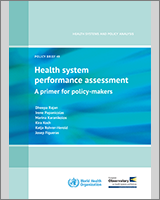NCBI Bookshelf. A service of the National Library of Medicine, National Institutes of Health.
Key messages
Increasing health system performance is critical in creating resilient health systems. If health policies are to foster the ability to withstand shocks like the COVID-19 pandemic, they need to focus on the right interventions that strengthen health systems – those that improve performance.
- Assessing the performance of a health system effectively is the first step to improving it.
- This requires a conceptual lens through which to view the health system structures, its inputs and the outputs and outcomes that they feed into.
- The Health System Performance Assessment (HSPA) Framework for Universal Health Coverage (UHC) offers policy-makers a conceptual tool to assess performance effectively.
- It provides a rigorous description of the four health system functions – governance, resource generation, financing and service delivery – and their sub-functions that matter most for the function-level and overall system performance.
- It builds on existing tools and frameworks but orients the analysis of health system assessment exercises towards system performance.
- It identifies impacts on health system performance and encourages operational focus.
- The HSPA Framework for UHC has real-world applications and helps direct policy action.
- It allows policy-makers to understand how the health system works and how its functions and sub-functions are linked to the “assessment areas” that explain performance.
- It provides an explanation of the health system bottlenecks that contribute to specific policy challenges.
- This will support efforts to pinpoint the person, group or institution that can and should take responsibility for remedial action and promote accountability.
- Its insights into the governance function will help policy-makers to use governance as a lever to achieve health system goals.
Contents
About the Series
Address requests about publications of the WHO Regional Office for Europe to:
Publications
WHO Regional Office for Europe
UN City, Marmorvej 51
DK-2100 Copenhagen Ø, Denmark
Alternatively, complete an online request form for documentation, health information, or for permission to quote or translate, on the Regional Office web site (http://www.euro.who.int/pubrequest).
All rights reserved. The Regional Office for Europe of the World Health Organization welcomes requests for permission to reproduce or translate its publications, in part or in full.
The designations employed and the presentation of the material in this publication do not imply the expression of any opinion whatsoever on the part of the World Health Organization concerning the legal status of any country, territory, city or area or of its authorities, or concerning the delimitation of its frontiers or boundaries.
The mention of specific companies or of certain manufacturers’ products does not imply that they are endorsed or recommended by the World Health Organization in preference to others of a similar nature that are not mentioned. Errors and omissions excepted, the names of proprietary products are distinguished by initial capital letters.
All reasonable precautions have been taken by the World Health Organization to verify the information contained in this publication. However, the published material is being distributed without warranty of any kind, either express or implied. The responsibility for the interpretation and use of the material lies with the reader. In no event shall the World Health Organization be liable for damages arising from its use. The views expressed by authors, editors, or expert groups do not necessarily represent the decisions or the stated policy of the World Health Organization.
This policy brief is one of a new series to meet the needs of policy-makers and health system managers. The aim is to develop key messages to support evidence-informed policy-making and the editors will continue to strengthen the series by working with authors to improve the consideration given to policy options and implementation.
Box
What is a Policy Brief?
- NLM CatalogRelated NLM Catalog Entries
- Review Tuberculosis.[Major Infectious Diseases. 2017]Review Tuberculosis.Bloom BR, Atun R, Cohen T, Dye C, Fraser H, Gomez GB, Knight G, Murray M, Nardell E, Rubin E, et al. Major Infectious Diseases. 2017 Nov 3
- Review Health systems resilience during COVID-19: Lessons for building back better[ 2021]Review Health systems resilience during COVID-19: Lessons for building back betterSagan A, Webb E, McKee M, Greer SL, Karanikolos M, Williams GA, Cylus J, Richardson E, Waitzberg R, Lessof S, et al. 2021
- Review Successes and challenges of health systems governance towards universal health coverage and global health security: a narrative review and synthesis of the literature.[Health Res Policy Syst. 2022]Review Successes and challenges of health systems governance towards universal health coverage and global health security: a narrative review and synthesis of the literature.Debie A, Khatri RB, Assefa Y. Health Res Policy Syst. 2022 May 2; 20(1):50. Epub 2022 May 2.
- Universal coverage challenges require health system approaches; the case of India.[Health Policy. 2014]Universal coverage challenges require health system approaches; the case of India.Duran A, Kutzin J, Menabde N. Health Policy. 2014 Feb; 114(2-3):269-77. Epub 2013 Nov 25.
- Review Health system performance assessment: A framework for policy analysis[ 2022]Review Health system performance assessment: A framework for policy analysisPapanicolas I, Rajan D, Karanikolos M, Soucat A, Figueras J. 2022
- Health system performance assessmentHealth system performance assessment
Your browsing activity is empty.
Activity recording is turned off.
See more...
